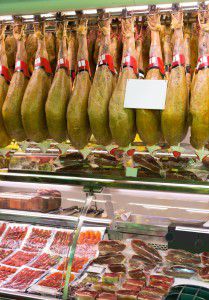Supermarket Swipe
I’m a Morrisons kind of girl.
And when I look longingly into my box of Yorkshire Tea and see nothing but tealeaf dust, I miss it.
I miss a store layout I recognise. I miss being a ble to identify what things are without imaginative guess work and Google Translate. But most of all, I miss English products.
ble to identify what things are without imaginative guess work and Google Translate. But most of all, I miss English products.
When you are far from home and craving custard, and the mere pronunciation of the word ‘vanilla’ fills shop assistants with mirth, you too will experience saudade at the thought of your local supermarket. Because supermarkets abroad sell all manner of things that you would not expect to find. And asking for help when you aren’t exactly sure what you’re asking for is everything from embarrassing to adventurous.
It’s tricky out there.
My fellow Brits abroad: on returning home, don’t be surprised if you feel the sudden urge to run into your nearest supermarket and pull the fishmonger into a tight embrace. Just make sure he doesn’t have a fish filleter in his hand when you do.
Still, never let it be said that there aren’t delightful discoveries to be made Out There. Here is a selection of my own that I haven’t yet decided if I am looking back on with fright or fondness.
China
China might be a bit of an outlier in the joy of supermarket shopping. The ones I went to were the full several-floor ‘we sell everything you can think of and probably some things you have nightmares about’ flavour, with counters offering up an array of unknowns and unidentifiables.
If you are an avid coffee drinker, it might be wise to take a stash of your own. Those crimes-against-coffee all-in-one sachets of coffee, milk powder and sugar are enough to make any coffee aficionado turn and weep.
Something that truly delighted me in Chinese supermarkets (and yes. I am easily amused) was that you can buy milk in pouches. Rather than the cartons we are used to in the UK, milk here – and expect a wide variety of dairy, soya and rice milk – is often sold in these thick, plastic pouches that have a satisfying squishy feeling when you juggle them in your hands. Not that you should really do that. Unless you want an audience.
Hungary
 Hungary is the land of paprika and sour cream. Paprika comes in different strengths of spiciness and there are either ‘regular’ or ‘sweet’ varieties to choose from. Sour cream (tejfol) has all sorts of uses in both sweet and savoury dishes, and you can buy it in all manner of sizes – from the small cartons arranged like pots of fromage frais, to the litres of the stuff in containers the size of those value packs of magnolia paint at B&Q. (It is also apparently a very effective ‘after sun’, but I’m not sure about that.)
Hungary is the land of paprika and sour cream. Paprika comes in different strengths of spiciness and there are either ‘regular’ or ‘sweet’ varieties to choose from. Sour cream (tejfol) has all sorts of uses in both sweet and savoury dishes, and you can buy it in all manner of sizes – from the small cartons arranged like pots of fromage frais, to the litres of the stuff in containers the size of those value packs of magnolia paint at B&Q. (It is also apparently a very effective ‘after sun’, but I’m not sure about that.)
Supermarkets in Hungary are generally smaller than you may be used to at home, but they are pretty well stocked. For some reason, apples are on the pricey side, but the fact that you can buy cherries (both normal and sour, which are delicious) and all manner of berries for a fraction of the price you’d pay at home more than compensates. Another surprising thing is that Spar is an actual supermarket, rather than the emergency-chocolate-fix kind of place that I am used to.
Spain
 Pig legs. Whole pig legs, right down to hoof, are dangled from ceilings and fanned out on counters in enticing displays. This is not a delicacy, but an everyday food product that you will find in many a Spanish kitchen. Ham is so important to Spaniards you could say it is part of the culture. From jamón serrano to jamón york, and a whole spectrum in between, you will never be short of ham if you need it.
Pig legs. Whole pig legs, right down to hoof, are dangled from ceilings and fanned out on counters in enticing displays. This is not a delicacy, but an everyday food product that you will find in many a Spanish kitchen. Ham is so important to Spaniards you could say it is part of the culture. From jamón serrano to jamón york, and a whole spectrum in between, you will never be short of ham if you need it.
For those of you who like to bake, be prepared to make some product replacement choices. Butter and margarine is available here but since most cook and bake with oil instead, and pour oil on their toast in the morning, you might not find exactly what you were looking for.
Alcohol is incredibly cheap here, and very good quality. Good wine is pretty much a given, and when you can buy nice cava for under two euros, or a can of beer for less than 30 cents, you can wonder at how people aren’t walking around constantly merry all day long.
There is a huge range of disposable products in Spanish supermarkets, including napkins, tissues and kitchen roll. And plates, bowls and cups. They even have the ‘balloon’ glasses in plastic form, just in case you decide on a cheeky gin and tonic on an impromptu picnic.
Finland
Our last whistle-stop on the supermarket tour is in the beautiful Finland, with large supermarkets of enough content to satisfy even the most dithering of customers (me). There are more varieties of sausage here than I have ever seen in my life, delicious rye breads, and very good cheese and salami.
One thing that threw me a little was an ‘addition’ to the toilet tissue aisle that I hadn’t anticipated. Since Finland is the land of the sauna, and more importantly, the all-naked sauna, there are disposable sauna ‘tissues seats’ for you to sit on that you can purchase in multipacks, ready for your public sauna experience. If you have your own sauna, and what self-respecting Finn doesn’t, you should of course purchase your own special sauna ‘pad’, which comes in a range of covers, colours and thicknesses. It is a whole new world.
These items might seem like an odd collection of things, and in many ways they are. But on a day when all you want is the home comfort of knowing in which aisle to find a tin of beans, good tea bags, and a bakewell tart, the call of the home supermarket is strong. Especially the bakery aisle. Oh, how I miss the bakery aisle…
Kelly
New Year traditions around the world
Happy New Year! Whether you’re already there, or have a few more hours to wait, we hope that 2015 will be a fantastic year and bring you everything you hope for.
As the celebrations get underway, here are a few interesting New Year traditions from around the world…
Twelve grapes
In Spain, eat a grape for each strike of the clock at midnight; if you manage to eat all twelve during the chimes, you’ll have twelve months of good luck.
First-footing
This is the tradition of being first into a house after midnight, in Scotland and Northern England. The first-foot should bring gifts of a coin, bread, salt, coal, or whisky, which represent financial prosperity, food, flavour, warmth and good cheer. The best kind of first-foot is believed to be a tall, dark-haired man.
Kissing
A tradition from German and English folklore says that you must kiss someone at midnight, and that that person will be significant in your future. If you don’t kiss anyone, it means you’re doomed to a year of loneliness. Apparently.
Yellow underwear
In Chile, if you want good luck and prosperity in the new year, wear yellow underwear – inside out – and then turn it the right way after midnight.
Making a lot of noise
In the Phillippines, the New Year’s custom is to make a lot of noise at midnight, to frighten away evil spirits. People buy small horns called torotots and also use paputok (firecrackers) as well as banging pots and pans and revving their vehicle engines.
Burning ‘Mr Old Year’
In Colombia, the previous year is seen out by families as they build large stuffed male dolls filled with different materials, and items that they no longer want or that have sad memories attached to them. Then they burn the doll at midnight, which represents burning the past and looking to the future.
Lentils
The first thing you should eat after midnight in Hungary is lentil soup, because it’s believed that lentils will bring you riches in the new year – and the more lentils you eat, the richer you’ll be.
New Year Dip
In various towns on the Welsh coast, brave swimmers take a dip in the freezing sea on New Year’s Day. Some people do it in fancy dress – and no, we don’t know why.
How will you be celebrating the New Year? Whatever you’re doing we hope you have a great time!
15 cultural faux pas to avoid when travelling
Before you go on holiday, or on a business trip abroad, it’s a great idea to learn a little of the local language. But getting along with people is about much more than just the words you say. There are other rules too, so here are our top tips to avoid misunderstandings abroad.
1. Be very careful when exchanging business cards in Japan: they aren’t just cards, but representations of the giver and should be handled with some ceremony. NEVER write on a business card or put it in your back pocket, as this is considered disrespectful.
2. Don’t talk about work over dinner in New Zealand, even if you’re having a meal with your colleagues. It’s fine to talk business over lunch, though.
3. In Muslim countries it’s considered an insult if you show the soles of your feet, so watch how you sit.
4. If you’re in Hungary and you’ve been told your meeting is at ‘fél négy’ (‘half four’), don’t turn up at 4:30 – ‘fél négy’ actually means half an hour TO four, so you’ll need to be there at half past three.
5. On the other hand, if you’ve been invited to a gathering in France, always aim to arrive 15-30 minutes late, to allow the host time to get ready.
6. Making a circle with your forefinger and thumb as another way of saying ‘OK’ is seen as an extremely offensive gesture in Brazil. As is the ‘thumbs up’ gesture in Iran, and showing your palm in Greece. It might be better to just avoid hand gestures altogether…
7. In Germany, not making eye contact when you clink glasses is considered very rude. It also, apparently, means you’ll have seven years’ bad luck in the bedroom. So even if you’re not worried about being thought bad-mannered, it might be worth making the effort. Just in case.
8. In Bulgaria, nodding your head means no, and shaking your head means yes, which is the opposite of what most of us are used to. This is worth remembering or you could get yourself into all kinds of trouble.
9. It’s been illegal to bring chewing gum into Singapore since 2004, because of the damage being caused to public buildings and facilities by people leaving their gum behind. You can also be fined for not flushing a public toilet.
10. In Russia, if you’re giving someone flowers, make sure you give them an odd number. Even numbers are for funerals.
11. It’s important to show respect to your elders in Asia, so don’t call them by their name; instead use ‘Auntie’ or ‘Uncle’, even if you don’t know them.
12. When eating a meal in Spain, you’ll be expected to clear your plate, and leaving some food is seen as rude. In Russia, on the other hand, you’re expected to leave a little as a sign that your host has provided enough to fill you up. And in China, a polite belch when you finish eating is considered a compliment to the chef, although it’s frowned upon in many other countries.
13. Never say anything disrespectful about the king in Thailand, as this could land you in prison for several years.
14. Make sure you’re appropriately dressed before going to church in Italy. This means your shoulders, knees and midriff should all be covered, or you won’t be allowed in.
15. In Malawi, it’s common for people of the same sex to hold hands; this is a sign of close friendship, so don’t worry if someone tries to take your hand. It’s a compliment. Men and women holding hands is rare, though, and may be frowned upon.
As always, if anyone has any others, we’d love to hear from you!
Christmas celebrations!
Today is our last day in the office before the Christmas break. It seems like it’s crept up on us this year but now with just two days to go, we’re starting to look forward to our various celebrations. I asked a few people how they’ll be celebrating this year.
Lotta:
My mother is Finnish so we (my three siblings, partners, niece and nephew) have our Christmas meal and presents on Christmas Eve at her house, which is always beautifully decorated Scandinavian style (no tinsel!). That means Christmas Day is like Boxing Day where we just chill out, watch TV and have left overs.
On Boxing Day (26th December) I will cook at my house and have some of my husband’s cousins over, who are from Albania and don’t really celebrate Christmas, but like to get together – and will hopefully like my cooking!
Katie:
I go to my parents, who live up north, and because they live in the middle of nowhere, it’s a nice, quiet setting to celebrate. On Christmas Eve, I help prepare the veggies and set the table so all my Dad has to do is cook the dinner on the day! We exchange presents at midnight and on Christmas Day, we have dinner around 2pm before settling into playing some mahjong with the family.
Zsolt:
We usually buy a Christmas tree, then we spend about two hours in squeezing the Christmas tree into the previous year’s Christmas tree stand which is usually much smaller than the current one. After realising how many things we haven’t bought for the Christmas dinner, we start to decorate the tree and then get a surprise when we see that the cheap Christmas tree lights that we bought in the market for £0.99 don’t work.
When we have enough stress, we start cooking and feel happy because we have a lot of time until our guests arrive, then suddenly someone rings the door bell. Our uninvited guests enter the flat and start consuming half of the food we planned to serve for the dinner.
Hanna:
I’ll be celebrating in Finland by eating too much Christmas ham, going to a Christmas concert, and listening to the Declaration of Christmas Peace. I wanted to go skiing but there’s no snow 🙁
Sheila:
I am trying to make a Trinidadian rum cake for Christmas this year… this is the first time I’m trying to make it – it’s an old family recipe. When I was younger my Gran used to send one in the post every Christmas. Preparations started in August! Step 1 is soaking lots of fruit in rum and cherry brandy for a few months…
Peter:
In the Ukraine we celebrate Christmas on 7th January. Children go from house to house and when people answer the door the children throw a handful of grain then sing a song in exchange for sweets or money (sort of a combination of Halloween and carol singing).
We’d love to hear how you plan to celebrate the holiday. Have a lovely Christmas and New Year everyone. We’ll be back in 2012!
Liz
A Goulash guy in foggy London
If you ever go to Hungary, and you happen to ask someone about a  restaurant where exceptional goulash soup is served, don’t be surprised if 8.5 people out of 10 reply, “I don’t speak English” (even if they do). The reason is not related to our average IQ, which is fortunately relatively high, but it’s based on our Eastern European bringing-up.
restaurant where exceptional goulash soup is served, don’t be surprised if 8.5 people out of 10 reply, “I don’t speak English” (even if they do). The reason is not related to our average IQ, which is fortunately relatively high, but it’s based on our Eastern European bringing-up.
In Hungary people are very shy and inhibited thanks to 40 years of strict Communist breeding. We have been taught to keep quiet and we are very good at this. Even today, a couple of generations later, it’s still coded in our genes and it is a difficult task to laugh and enjoy something without asking permission before doing it.
In our schools the expectations are very high. If you cannot pronounce the “th” sound perfectly by pinching your tongue with your teeth, you fail and go to jail.
No, just kidding, but it’s still not easy to pass English exams.
Teachers compliment-wise are very stingy. They usually don’t say anything laudatory, as it would be harmful pedagogically (based on Russian scientific researches from the 70s, which we have to take really seriously).
If you want to have a certificate in English in Hungary, prepare for the worst – you have to talk about the blue jay’s ritual dancing habits or paraphrase the rules of Malay football in English, subjects that you’ve never heard of in your life and probably you couldn’t say a word about even in Hungarian.
For this reason when a typical Hungarian goes to a different country, it is a challenge to her/him to start speaking confidently in the language of the country she/he visits. We always can see the little guy in the black jump-suit with the pitchfork on our left shoulder, saying, “Don’t even think about saying anything, your pronounciation is horrible, you might even hurt someone.”
Don’t be afraid, the little guy is wrong, take courage and speak!
Zsolt





